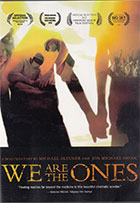
We Are the Ones 2015
Distributed by Passion River Films, 154 Mt. Bethel Rd., Warren, NJ 07059; 732-321-0711
Produced by Michael Skinner and Jon Michael Shink
Directed by Michael Skinner and Jon Michael Shink
DVD, color, 62 min.
Middle School - General Adult
Health Services, Compassion, Culture, Disaster Relief, Diversity, Documentary, Genocide, Delivery of Health Care, Medicine, Africa, Sudan
Date Entered: 10/05/2016
Reviewed by Joseph Baumstarck, Jr., University of Louisville, Southern Baptist Theological Seminary, Ivy Tech Community CollegeWe Are the Ones documents the provision of medical care by three courageous healers in the troubled region of South Sudan. This well done and significant film shows how three medical care providers from widely diverse backgrounds can work together to provide badly needed health care in a dangerous, violent, and fragmented part of the world. Glenn, an American trained surgeon, spearheads a threesome united by their desire to provide relief of medical distress for all in need, despite being in a region where some are intent on “seizing a future at others’ expense.” Ajak and Francis who are products of the violence and disruption in South Sudan join Glenn despite their origins in different factions of the feuding tribal elements. This trio understands that health care in South Sudan is fractured and broken by a system which prevents those in need from utilizing the appropriate medical facilities needed due to barriers created by distrust, violence and government bureaucracy. Despite their different backgrounds and the distrust of some Sudanese towards them they breach these barriers and resolve to provide health care to any who need it at grave personal risk to themselves. Along the way they are able to provide meaningful care and although they do not succeed in breaking down artificial barriers completely they are able to begin a process which could lead to complete erasure of them in the future.
This film does an excellent job of explaining the situation in South Sudan for audiences not familiar with the country. Although South Sudan is recognized by the United Nations as an independent nation it is anything but a united nation. South Sudan is composed of three tribes that have been feuding for many years. Due to the violence associated with these feuds the populations in each of the tribal areas have been decreased to the point where women and children are being abducted from neighboring tribes and from each other to bolster populations in the feuding tribes. This is the violent and distrusting situation to which the unlikely trio elects to provide health care using the axiom of “peace through the bridge of health care.” Realizing that health, children, and hope are the last three things all people want to give up the trio decides to fight one of the underlying causes of much of the strife – the infertility due to syphilis. Although the treatment for syphilis is usually simply antibiotics this is difficult in an area where few medications are available and adequate means of distribution to those who need these medications is affected by violence, jealousy, and strife. Refusing to accept the status quo the trio puts themselves on the line to cross tribal and bureaucratic boundaries to treat those in need. Despite the tribal violence which frequently erupts around them they manage to provide a significant amount of health care in all three tribal areas and soon their courage is recognized. Their courage sets a model for others to follow and slow progress toward a better life is achieved in the region. Glenn sets a tough love tone when he makes it clear that he will be leaving to return to “his people” in America leaving his two helpers from different tribes to carry on the needed health care and encouraging the tribal and political leaders to begin to solve their problems rather than continuing to create more.
There are no significant negatives to this film and the positive aspects are many. This is a meaningful, relevant, uplifting, and highly important film for all audiences from middle school to general adult. This highly recommended film would provide an ideal discussion platform for many college level courses, church and mission groups, health care related endeavors, library discussion groups, and for all who care about their fellow humans.
Awards
- Winner of Hero Award by My Hero Film Festival, Los Angeles, 2014